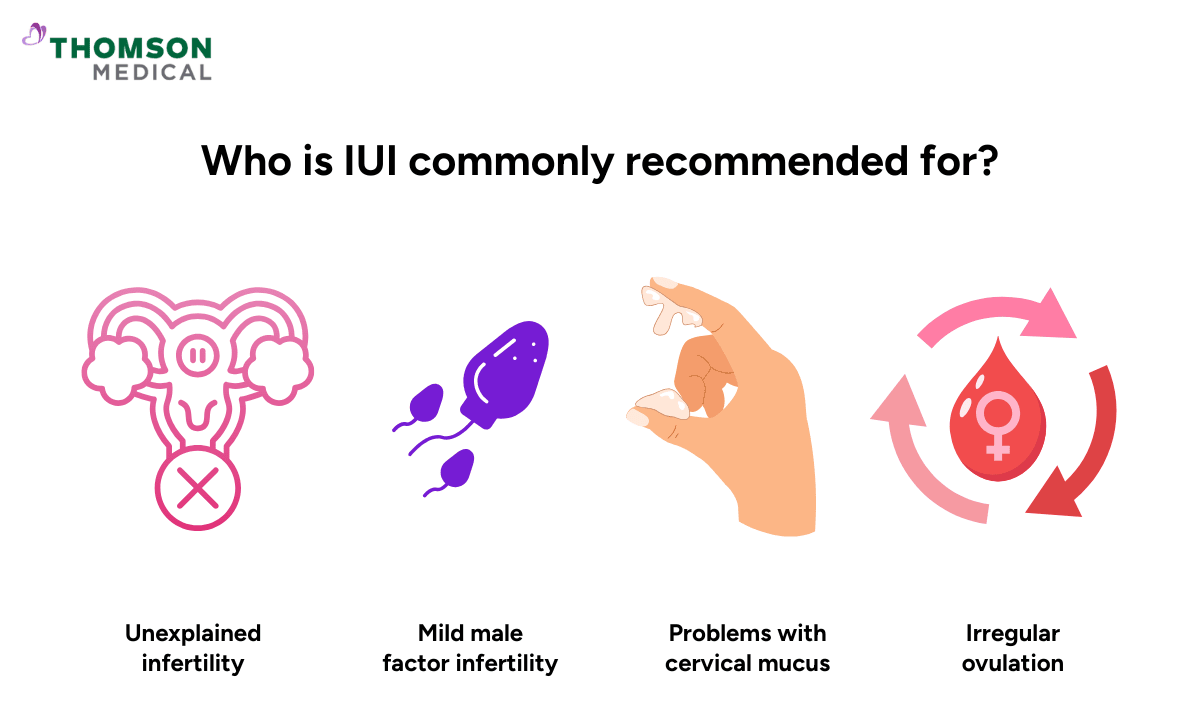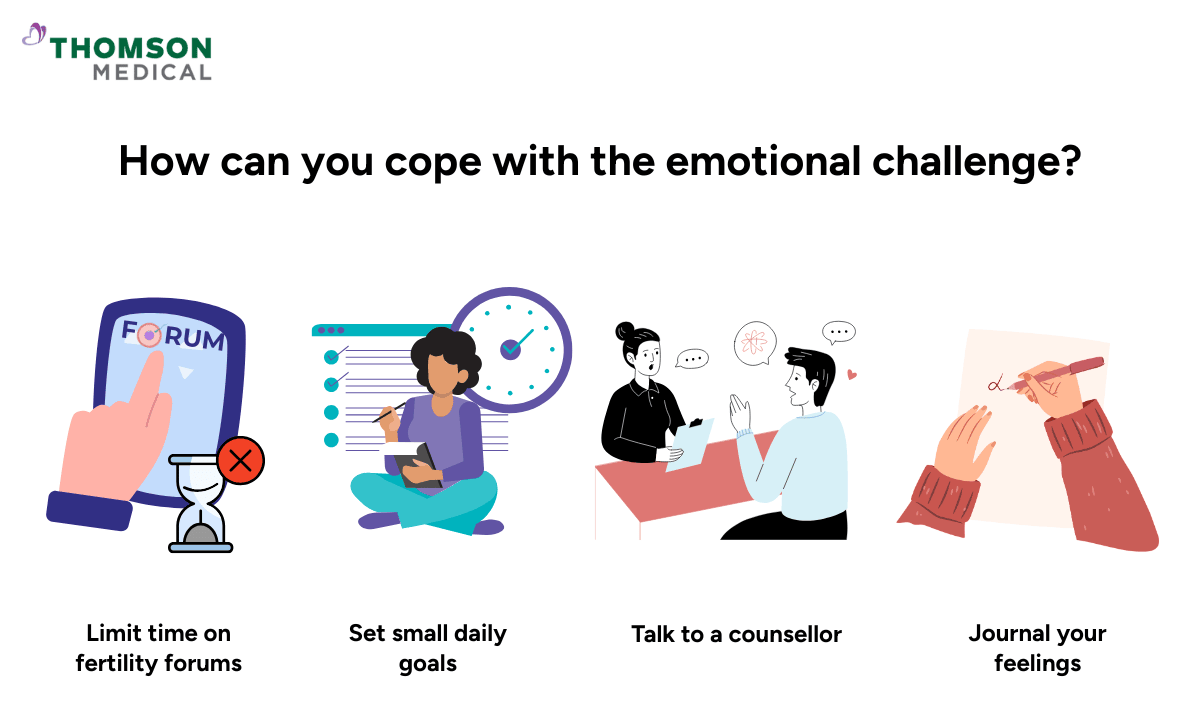If you’ve just had your IUI treatment, it's normal to feel both hopeful and anxious about what comes next. This is especially the case since you now have to wait two weeks before taking any pregnancy tests. Many couples describe the two-week wait as more emotionally challenging than the procedure itself. Knowing what’s happening in your body, how to care for yourself, and knowing when to take a pregnancy test can help make the next 14 days more manageable.
What is IUI?

Intrauterine insemination (IUI) is a fertility treatment where prepared sperm is placed directly into your uterus (womb) around the time your ovary releases an egg (ovulation). This shortens the distance sperm needs to travel to reach the egg in the fallopian tube, increasing the likelihood of fertilisation.
Fertility specialists commonly recommend IUI for:
Mild male factor infertility, such as low sperm count or motility
Problems with cervical mucus (the fluid in your cervix that helps sperm travel)
Using donor sperm
Irregular ovulation
After your IUI procedure, you begin the two-week wait. This is the period of about 14 days between the procedure and when a pregnancy test can provide reliable results. This waiting period is important because your body needs time for the fertilised egg to implant in the uterus and for your pregnancy hormone (hCG) levels to rise enough to be detected on a test.
What's happening in your body during the wait?
After your IUI, several important processes are likely taking place, though you won't be able to feel most of them. Here's a timeline of events that typically occur:
| Timeline | What's happening |
|---|---|
Days 0-1 | Ovulation occurs. The sperm travels towards the fallopian tubes |
Days 1-3 | This is when the sperm might meet and fertilise the egg in the fallopian tube |
Days 3-5 | The fertilised egg (now called an embryo) makes its way to the uterus |
Days 6-10 | Implantation could occur in the uterine lining |
Days 10-14 | hCG hormone levels begin to rise if pregnancy has occurred |
However, please remember that these timelines are approximate and can vary from woman to woman.
Our fertility doctor in Singapore
Loading...
How should you take care of yourself during the wait?
While there's no guaranteed way to ensure pregnancy success, you can support your overall health and wellbeing during this crucial period.
Continue your normal activities:
Maintaining your usual routine with work, hobbies, and social activities offers a healthy distraction from constant worry. Light exercise like walking or gentle yoga is beneficial for both your physical and mental wellbeing.
Nourish your body properly:
A balanced diet with whole grains, lean proteins, plenty of fruits and vegetables, and healthy fats provides the nutrients your body needs during this time.
You can also continue taking your prenatal vitamins as your doctor directed.
For more guidance on what to eat after IUI, follow your clinic’s dietary recommendations and focus on nutrient-dense, minimally processed foods.
Prioritise rest and hydration:
Adequate sleep plays an important role in regulating your hormones and maintaining emotional balance, while drinking plenty of water throughout the day supports your body's natural processes.
Manage stress actively:
Meditation, gentle yoga, journaling, or guided relaxation exercises can provide relief during these anxious moments.
If you are feeling overwhelmed by anxiety during the two-week wait, request an appointment with Thomson Medical. Our specialists can help provide personal guidance and practical strategies to help you manage stress and anxiety during this period with confidence.
What should you avoid during these two weeks?
Certain activities could interfere with implantation or early pregnancy development. During the two-week wait, it is advisable to avoid the following:
Smoking and alcohol
High-intensity workouts or heavy lifting
Testing too early with home pregnancy tests
Hot tubs, saunas, or very hot baths to prevent a rise in core temperature that may harm embryo implantation and early pregnancy
Excessive caffeine consumption. Limit yourself to 200 milligrams per day or about 2 cups of instant coffee
What symptoms might you experience?
Your body is going through hormonal shifts during the wait. Some people notice various changes, while others don't feel anything at all. Many early pregnancy signs are similar to premenstrual symptoms and can also be side effects of progesterone (hormone support medication).
Common experiences include:
Mild cramping or bloating
Breast tenderness
Fatigue
Mood swings
Light spotting
When should you take a pregnancy test?
Testing too soon is one of the most common sources of uncertainty and inaccurate results during the two-week wait. Wait at least 14 days after your IUI before taking a home pregnancy test. Many clinics will schedule a beta hCG blood test around this time, which is more sensitive and accurate than home urine tests.
Testing too early can lead to misleading results:
False positive:
If you received an hCG trigger shot, this can show up on a test if you check too soon, suggesting pregnancy when it hasn't actually occurred yet.
False negative:
Testing before hCG levels are high enough may incorrectly suggest the procedure failed when pregnancy may have actually occurred.
If you’re unsure about when to take a pregnancy test or how to interpret your results, request an appointment with Thomson Medical. Our fertility specialists can guide you to the right timing for testing and explain what your results mean.
How can you cope with the emotional challenge?

The uncertainty of the two-week wait, combined with hormonal changes, can leave you feeling anxious, hopeful, frustrated, or all of these at once. Here are practical ways to manage:
Limit your time on fertility forums if reading other people's experiences increases your anxiety. Everyone's situation is different.
Set small daily goals to give yourself a sense of accomplishment, whether that's work-related or personal activities you enjoy.
Talk to a counsellor or join a support group specifically designed for people who are undergoing fertility treatments. Sharing your feelings with others can ease the sense of isolation.
Use mindfulness apps or practise meditation to help you relax and stop constantly worrying about the outcome.
Journal your feelings as a healthy outlet for processing your emotions.
FAQ
Can I exercise during the two-week wait?
Yes, moderate, low-impact exercise is generally fine. Walking, gentle yoga, or light swimming offers both physical benefits and stress relief. It's best to avoid strenuous workouts, high-impact sports, or heavy lifting until you know whether you're pregnant.
Why do I have to wait two weeks after IUI?
After fertilisation, it takes 6-10 days for implantation to occur. Your body then needs more time to produce sufficient levels of the pregnancy hormone hCG for it to be detectable in a pregnancy test. Testing after two weeks ensures reliable results.
How can I support implantation during the two-week wait?
While there's no guaranteed method to ensure implantation, you can create the best possible environment. Eat nutrient-rich foods, particularly those high in folate, zinc, and healthy fats. You can continue taking prenatal vitamins as prescribed, follow your doctor's medication plan carefully, and minimise stress while getting adequate rest.
What are the early signs that IUI has worked?
There’s no single symptom that can reliably tell you whether the IUI was successful. Some people experience light spotting, breast changes, mild cramping, or a missed period. However, these can also be signs that your period is approaching or side effects from fertility medications. The only way to know for certain is through your scheduled pregnancy test.
Can I travel during the two-week wait?
Generally, yes. Travel is safe during this time unless your doctor has specifically advised against it. If you do travel, avoid extreme activities, stay well hydrated, and ensure you can follow your medication schedule without interruption. If you're travelling by air, get up and walk around periodically to maintain your blood circulation.
How can I cope with the anxiety of waiting?
Consider setting daily goals to give yourself focus, whether that's work-related or personal activities you enjoy. Talking with a counsellor or support group can provide valuable emotional support. Mindfulness apps and journaling can help you process your feelings. Some women find it helpful to plan activities or outings during this period to keep their minds occupied.
The information provided is intended for general guidance only and should not be considered medical advice. For personalised recommendations and tailored advice based on your unique situation, please consult a specialist at Thomson Medical.Schedule an appointment with Thomson Medical today.
References:
Edwards, M. J. (2006). Review: Hyperthermia and fever during pregnancy. Birth Defects Research Part a Clinical and Molecular Teratology, 76(7), 507–516. https://doi.org/10.1002/bdra.20277
For more information, contact us:
Thomson Fertility
- Paragon: 6252 7766
Thomson Specialists (Women's Health)
Request an Appointment